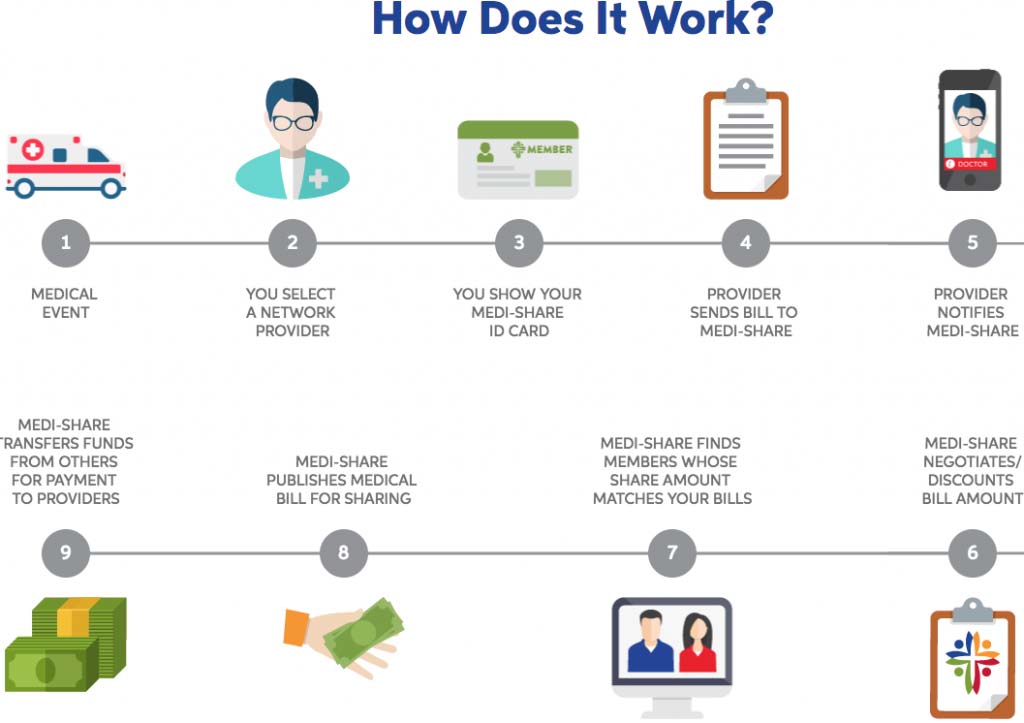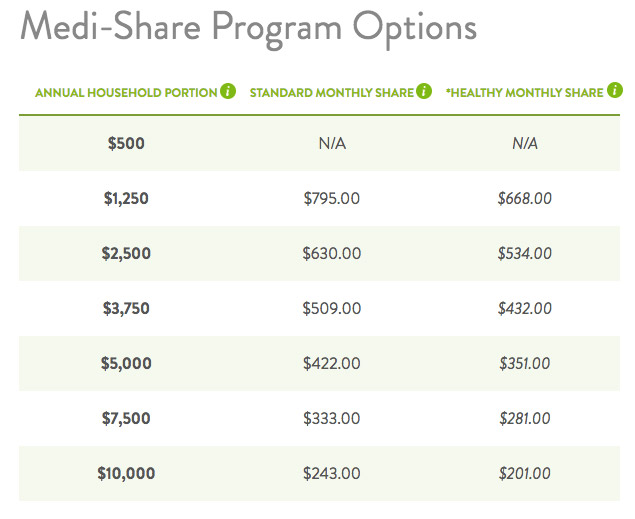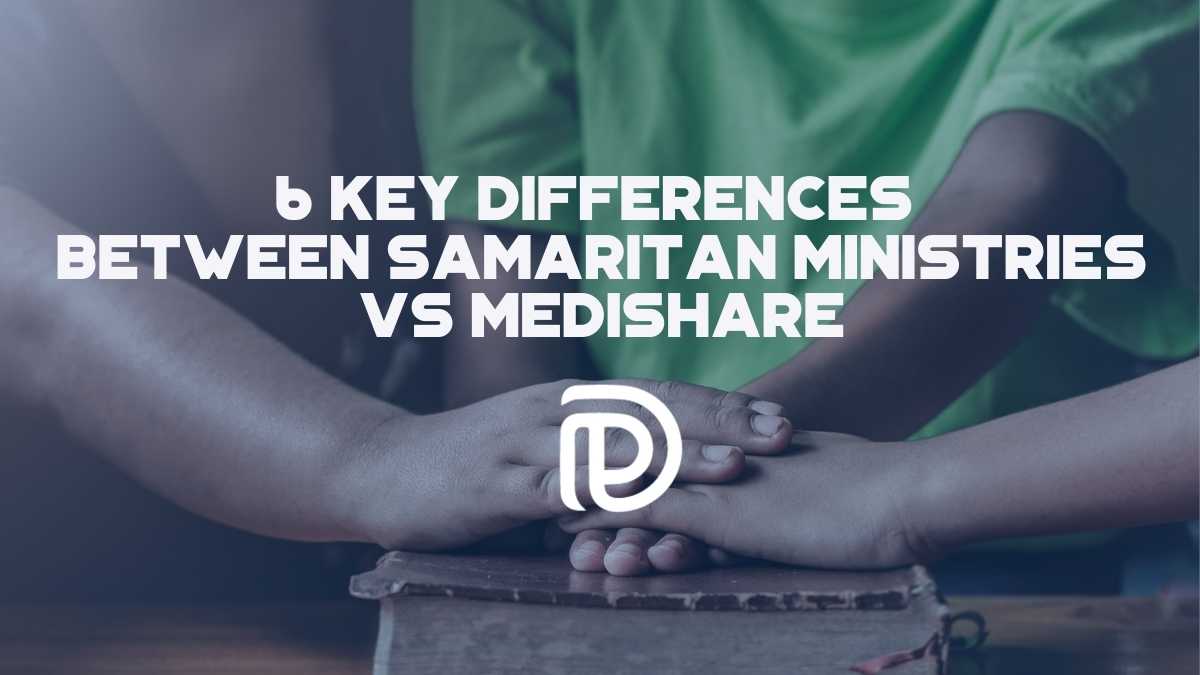6 Key Differences Between Samaritan Ministries vs Medishare
It seems as if our “affordable” healthcare is becoming more and more “un-affordable.” Recently, our family’s monthly premium went from $480/month to $1596/month! Knock on wood; we have been a very healthy family until now. So I decided to research other options, which led me to something called “health care sharing ministries”. The two main players that will be highlighted today are Samaritan Ministries vs Medishare
What Is A Health Care Sharing Program Or Ministry?
Health care sharing ministries (HCSMs) are an organization that assists in the sharing of health care costs among individual members who have common ethical or religious beliefs.
They are NOT health insurance.
Specifically, members send in their monthly premiums which are called “shares.” These shares are distributed to or on behalf of other members with medical expenses in accordance with program guidelines.
They are built upon the principle of people with similar beliefs and values coming together to share each other’s burdens, not unlike the risk-pooling nature of health insurance.
One reason they are becoming so popular is their cost to join. For only a few hundred dollars a month, families can become members versus traditional health insurance, which for many of us is well over $1,000 per month.
Part of the reason that they’re much cheaper than traditional health insurance is that they may have limited coverage regarding certain health conditions.
Make sure you read what limitations each company has before making your decision.
Here’s an overview of how one of the major players, Medishare, works:

Samaritan Ministries
What is Samaritan Ministries for those who are hearing it for the first time?
Samaritan Ministries is health care for people of biblical faith. We’re a group of like-minded believers who share one another’s medical expenses directly, person to person, household to household, without using any insurance at all.
We’ve been doing this now at Samaritan for a little over 22 years and currently, there are 65,000 families all across the country sharing in this way. That translates to about 210,000 individuals.
How does it work?
Every household joins and pays what we call a monthly share.
It’s a set amount, and currently, the shares would be:
- $220 for one person
- $440 for a couple
- $495 for a family of any size
Every month we coordinate all of those people sharing those expenses. We let them know where to send their monthly share.
The unique feature here is that members share directly with other members. (Key difference between Medishare and Samaritan)
As a Samaritan member, you don’t send my monthly share to the office. You have the opportunity to minister directly to a brother or sister in Christ by sending my monthly share directly to them.
The process is a very coordinated one. In other words, it’s not haphazard; we’re going to cross our fingers and pass the hat and hope that enough people send it.
We specifically allocate or direct the right amount of Samaritan members to send their monthly shares to somebody with a medical need.
Then, finally, the exciting thing is that in addition to sharing our financial needs, we can pray for one another and send cards and notes of encouragement. Community is really what makes this whole thing spin.
Let’s be clear: this isn’t insurance. This is a share program, correct?
That’s correct. There’s no contractual transfer of risk. This is a voluntary sharing situation.
It’s really crowdfunding for health care.
We’re becoming more accustomed to seeing more resources shared, whether it’s through Uber sharing transportation or Airbnb. This gets back to the Acts II church of God’s kids taking care of one another. You’re correct; it’s not insurance in any way.
As far as what the new administration will do, we’re hopeful that we’ll get away from regulations and mandates and taxes because that’s not the way to reform health care. If we’re going to really reform it, then we need to have a biblical understanding of what free markets are and what personal responsibility is and generous charity of a free people, not a people coerced through taxes, which is distributed to others, which is really not charity at all. It’s unjust.
Samaritan Monthly Costs
Here’s a nice breakdown of Samaritan’s monthly costs from the Samaritan Ministries Review site:
Similar to a premium, the monthly share is the amount you send each month directly to another member to help cover their medical needs.
Members of the Classic Level Membership agree to share expenses incurred for medical treatments specified in the Membership Guidelines.
The amount of the monthly share is based on household size (see chart below), regardless of your medical history, age (unless the individual is 29 or younger), or other factors.
Effective Oct 2, 2017, Samaritan has two membership levels to choose from:
- Classic
- Basic
Members of both plans can choose to add Save to Share, which is recommended for sharing needs above $250,000.
CLASSIC MEMBERSHIP
|
CLASSIC MEMBERSHIP
|
|
| Membership Type |
Monthly Share |
| One person | $220 |
| Individual Membership is < Age 29 | $160 |
| Two person family | $440 |
| Widowed or Divorced with Children | $305 |
| Three or more Person Family | $495 |
| PERSONAL RESPONSIBILITY (level where a need can start being shared) | $300/incident (can be reduced to $0 with discounts) |
| MAX SHAREABLE AMOUNT (including maternity, 2 person or higher required) | $250,000/incident (Save to Share-increases this to unlimited) |
| Samaritan shares 100% of qualifying needs which go above $300 in total cost on the Classic Plan. Prorating rules apply. |
|
——— OR ———-
BASIC MEMBERSHIP
Members of the Basic Level Membership agree to share expenses incurred for medical treatments specified in the Membership Guidelines.
The amount of the monthly share is based on household size and age group determined by the age of the head of household (see chart below), regardless of your medical history or other factors.
This plan level allows for smaller monthly share amounts, with greater personal responsibility portion and a 90/10 split sharing as detailed below (similar to a 90/10 co-insurance level).
| MEMBERSHIP SIZE |
AGE GROUPS (oldest member age) Monthly Share
|
||||
| 0-29 | 30-44 | 45-59 | 60+ | ||
| Individual | $100 | $120 | $140 | $160 | |
| 2 Person | $200 | $240 | $280 | $320 | |
| 3+ | $250 | $300 | $350 | $400 | |
| PERSONAL RESPONSIBILITY/SHARING THRESHOLD (level where a need can start being shared) | $1500/incident |
| SHARING PERCENTAGE (amount shared by members) | 90% of the amount that is shareable |
| CO-SHARE (amount paid by member on his/her own need) | 10% (up to maximum co-share) |
| MAXIMUM CO-SHARE (MCS) | $13,500 (applies even if get Save to Share) |
| MAX SHAREABLE AMOUNT (non-maternity) | $236,500 ($250,000 minus the MCS) (Can still join Save to Share to get sharing above $250k) |
| MATERNITY MAX SHAREABLE AMOUNT (2 person or higher required) |
$5000 (more sharing is available if certain conditions are met.) |
What is Medi-Share?
Just like Samaritan, Medi-Share is NOT health insurance. It’s a healthcare-sharing ministry membership program in which Christians share their financial resources to help pay for other members’ medical expenses.
Think of your local neighborhood. If one of your neighbors was in the hospital and couldn’t mow their yard, more than likely, some of the neighbors would pitch in and help out with their yard work.
Medi-Share works in a similar fashion.
It is based on the biblical principles of Christians helping other Christians and applied to healthcare expenses.
Here’s a brief video:
Here is a breakdown from their site about how Medi-Share works:
Each month, your monthly share is matched with another’s eligible medical bills. Through a secure online portal, Christian Care Ministry publishes the bills eligible for sharing and coordinates the direct sharing of medical costs between members.
You will know each month whose bills your share is helping pay, and when you have eligible bills, and your annual household portion (AHP) has been met, your fellow believers will be sharing those bills and praying for you as well.
How much does Medi-Share cost?
There are a few factors that go into play regarding what you’ll actually pay per month:
1. Age of the oldest applicant.
2. Number of people that will be participating: either one, two, or a family of three or more.
Once you input the two factors above, you next have to decide on:
A. The Annual Household Portion (AHP) is the dollar amount a household pays toward their eligible medical bills during a 12-month period before any eligible bill may be shared among members.
Instead of having a set insurance deductible, each household chooses its Annual Household Portion.
Here’s an example for someone like myself (40’ish) married with two kids:

Monthly Payment Options – Medi-Share’s system is like choosing a health insurance deductible and monthly premium.
Annual Household Portion (AHP) – in the first column above, the AHP ranges from as little as $500 for young singles to as much as $10,000 per year for families.
Similar to your insurance deductible, after you reach your Annual Household Portion through eligible medical costs that you pay, Medi-Share then publishes the remaining amount of your eligible medical bills on the platform so other members can share in the cost.
Standard Monthly Share – in the second column above. This is similar to a monthly insurance premium. Comparable to health insurance, the higher your annual deductible or annual household portion, the lower your monthly share cost.
Here’s an example of a healthy 25-year-old:
Medi-Share Program Options
| Annual Household Portion | Standard Monthly Share | *Healthy Monthly Share |
| $1000 | $232 | $207 |
| $1750 | $228 | $202 |
| $3000 | $180 | $161 |
| $4250 | $144 | $126 |
| $5500 | $128 | $115 |
| $8000 | $107 | $97 |
| $10500 | $80 | $71 |
*Healthy Monthly Share – Medishare offers an option for healthy individuals called the Healthy Monthly Share. This is the reduced monthly share amount (up to 20%) for households who meet the Health Incentive standards, which are determined based on:
- Waist Measurement
- BMI (Body Mass Index)
- Blood pressure
Click here to see how much your rates will be with Medi-Share.
Samaritan Ministries vs Medishare – Key Differences
Cost
Both Samaritan and Medishare are similar in cost. Medishare starts at $80/month vs $100/month for Samaritan.
Remember, with Medishare, different plans have different deductibles (called an annual household portion), and the copay (called a provider payment) is always:
- $35 for doctor/hospital visits
- $135 for emergency room visits
With Samaritan, you pay a flat fee of $300 per visit, and the rest (up to $250,000) is covered. This is like having no deductible and a $300 copay.
Doctor Visits
Want to see a doctor? No problem. With Medishare, they offer free virtual doctor visits via MD Live, which is a 24/7 on-demand access to US Board Certified doctors via video chat.
For serious issues, you will have to pay a fee of around $35 at a doctor’s office.
Being a Medi-Share member has additional benefits, including coverage for:
- Dental
- Vision
MediShare has a large provider network. But if you want to see an out-of-network doctor, you must pay a fee to do so.
For those using Samaritan, there is no network and you can see any doctor without penalty. You will have to self-pay, which means doctor visits are going to cost more. Keep in mind that you will have to pay out of pocket until your bill reaches a certain limit.
- Samaritan Classic = $300/incident
- Samaritan Basic = $1500/incident
Bottom line Regarding Costs
For most of us who are paying an arm and a leg for healthcare, you can’t go wrong with either of these companies to save you and your family thousands of dollars a year.
Discounts For Being Healthy
At this time, Samaritan does not offer discounts for their healthy members. Medishare offers a 20$ Healthy Monthly Share discount.
Method of Payment
With Medishare, your payment runs through an account at America’s Christian Credit Union.
Samaritan users send their payments directly to members in need.
Who Sends The Bills
Patients send bills to Samaritan, whereas the provider sends bills to Medishare.
Sharing Limits
One of the top questions many have regarding sharing ministries is:
Is there a limit to sharing?
Medishare
No limits when it comes to your bill being shared. This is one of the main reasons I chose Medishare over other companies. As of this writing, they do have a maternity limit of $125,000.
Samaritan
- Basic plan – max shareable limit of $236,500 and a $5000 2+ person maternity limit.
- Classic plan – max shareable limit of $250,000 and a $250,000 2+ person maternity.
For those members in need of a higher max shareable limit, then you will have to pay an extra yearly fee and an administrative fee (Save to Share program).
If you want a more in-depth look into why I chose Medishare, click here.
Don’t Miss Any Updates. Each week I’ll send you advice on how to reach financial independence with passive income from real estate.
Sign up for my newsletterFAQs
How do the monthly costs of Samaritan Ministries and Medi-Share compare for a single person with a pre-existing condition?
The monthly costs for both Samaritan Ministries and Medi-Share can vary for a single person, especially if they have a pre-existing condition. Typically, Samaritan Ministries might offer lower costs as they operate on a share model where fellow members contribute towards each other’s medical costs. However, pre-existing conditions might be handled differently by each program. Medi-Share members could face additional costs or limitations based on their medical condition. Prospective members should review the detailed information provided by each ministry, especially regarding their policies on pre-existing conditions, to determine the most affordable and suitable option.
How do Samaritan Ministries and Medi-Share approach coverage for prescription drugs and alternative treatments?
Both Samaritan Ministries and Medi-Share provide coverage for prescription drugs, but their approach to alternative treatments can differ. Medi-Share generally offers a more traditional insurance-like structure and may cover certain prescription drugs as part of their plan. However, coverage for alternative treatments is limited and subject to approval. Samaritan Ministries, on the other hand, relies on members to share costs directly, and while they may cover prescription drugs, coverage for alternative treatments might depend on the collective agreement and willingness of the members. It’s important for members to check with each health share plan for specific details regarding coverage for prescription drugs and alternative treatments.
What are the differences in the statement of faith requirements between Samaritan Ministries and Medi-Share?
The statement of faith requirements for Samaritan Ministries and Medi-Share are central to their operations, as both are faith-based health share plans. However, the specifics can vary. Medi-Share requires members to adhere to a specific Christian faith statement and lifestyle choices, such as abstaining from tobacco use and illicit drug use. Samaritan Ministries also has a statement of faith, but their requirements might be broader, allowing for a wider range of Christian beliefs. Prospective members should review the statement of faith for each organization to ensure their personal beliefs align with the ministry’s requirements.
How do Samaritan Ministries and Medi-Share handle high-cost medical events like a heart attack or major surgery?
For high-cost medical events like a heart attack or major surgery, both Samaritan Ministries and Medi-Share have systems in place to help members cover expenses. Medi-Share has an annual sharing limit and a member responsibility amount, which function similarly to a deductible and out-of-pocket maximum in traditional insurance. Samaritan Ministries operates on a direct-sharing model, where members send their monthly payments to other members with medical needs. However, there might be an initial unshareable amount similar to a deductible. Both ministries aim to support members during such events, but it’s crucial for members to understand the limits and procedures of their respective plans.
What are the advantages and limitations of using Samaritan Ministries or Medi-Share for individuals with chronic health issues like high blood pressure or heart conditions?
For individuals with chronic health issues like high blood pressure or heart conditions, both Samaritan Ministries and Medi-Share have their advantages and limitations. Medi-Share might offer more structured support for chronic conditions, similar to traditional health insurance plans, but may also have limitations on coverage and additional costs. Samaritan Ministries’ model is based on members sharing each other’s burdens, which can be beneficial for ongoing support, especially with a special prayer need. However, the coverage might be less predictable than Medi-Share. It’s essential for individuals with chronic health conditions to closely examine each plan’s coverage details and consider their ongoing healthcare needs when choosing the best option.


